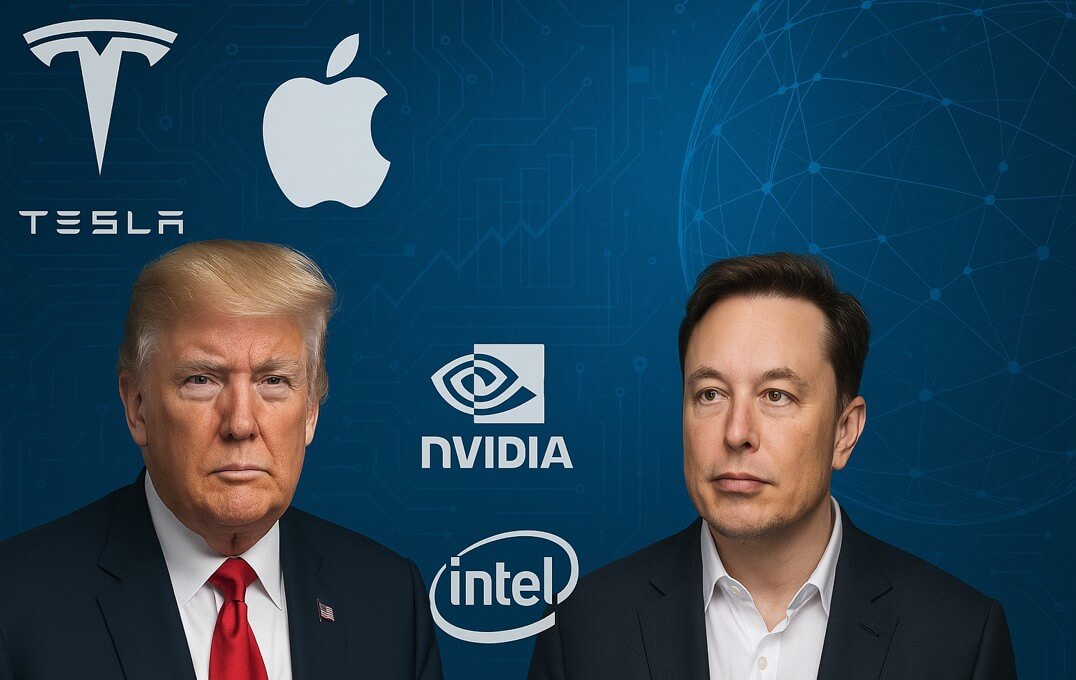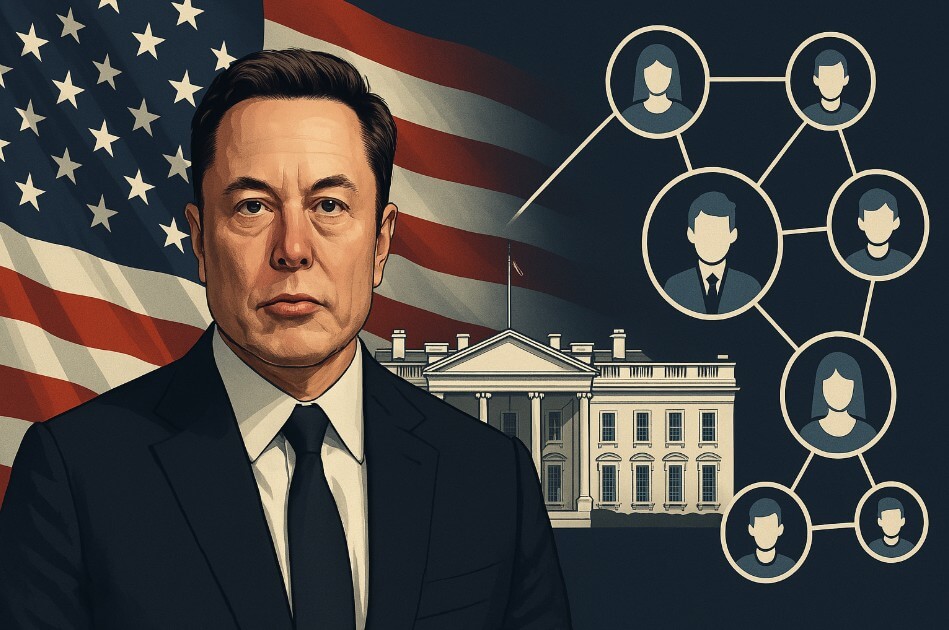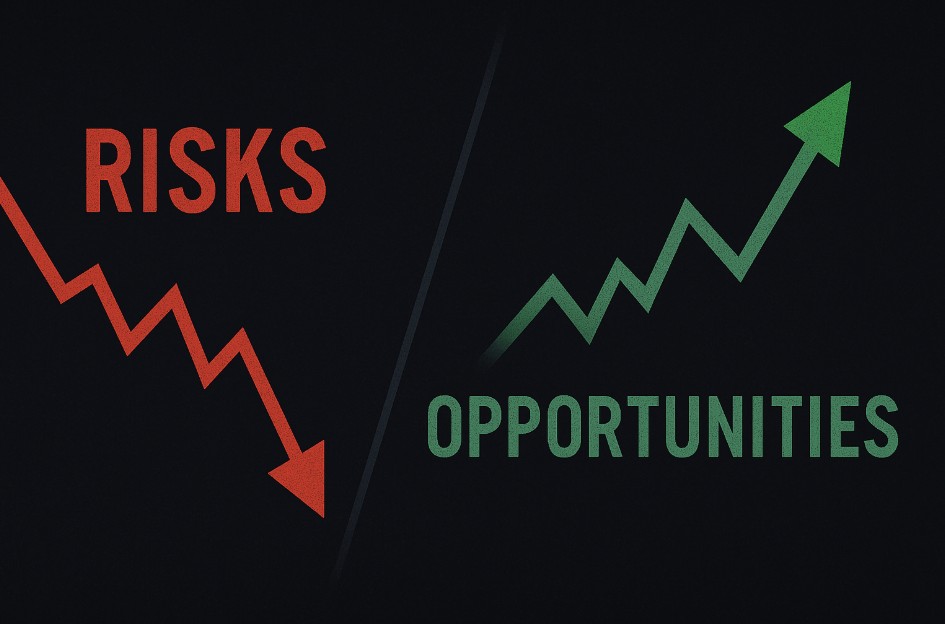
The technology sector is at a crucial turning point which is shaped by evolving economic policies, geopolitical tensions, and industry innovation. President Donald Trump's economic policies and Elon Musk's expanding influence in government initiatives are poised to impact tech stocks significantly in the near future. Investors and analysts are focused on how these factors will shape the performance of major technology companies.
President Donald Trump's economic policies have played a crucial role in shaping the performance of the technology sector. Policies such as trade tariffs and regulatory changes to government efficiency initiatives have introduced both challenges and opportunities for tech companies. While some firms may benefit from deregulation and domestic investment incentives, others could face headwinds due to trade restrictions and shifting federal budget allocations.

The Trump administration has reintroduced tariffs targeting key industries, including semiconductors, to support domestic production. While this move aligns with national security concerns and economic independence, it introduces volatility in the stock market. Tech giants like Nvidia, Apple, and Intel face uncertainty as global supply chains become more expensive to maintain.
Tariff concerns have already led to fluctuations in chipmakers' stock prices. Nvidia and AMD, which rely heavily on Taiwan-based TSMC, could experience cost hikes that impact margins.
The U.S. government has tightened restrictions on companies like Huawei and ZTE, limiting their ability to source U.S. technology. This move impacts American firms that rely on Chinese demand, such as Qualcomm and Micron Technology.
Trump's stance on deregulation could offer some relief to large tech firms, particularly in areas like data privacy and AI development. However, potential repeals of previous pro-tech legislation, such as the CHIPS and Science Act, might offset these benefits.
Elon Musk continues to be one of the most influential figures in the technology industry. Even though he's not the only one, he definitely shapes multiple sectors through his ventures in artificial intelligence, space exploration, and government efficiency. As the head of Tesla, SpaceX, and now the Department of Government Efficiency (DOGE), Musk’s impact extends beyond private enterprise into public policy and infrastructure. His ability to drive innovation, disrupt traditional industries, and influence government decisions makes him a key player in determining the future of tech stocks. Since Musk is a key contributor to the stock market, investors closely watch his actions and make decisions regarding them.

One of the most surprising developments in 2025 is the establishment of the Department of Government Efficiency (DOGE), led by Elon Musk. This initiative aims to reduce government spending by optimizing technology use across federal agencies. While Musk's leadership is expected to bring innovation, it also raises concerns for companies that depend on government contracts.
Companies specializing in AI-driven automation, cybersecurity, and cloud computing (such as Palantir, Microsoft, and Oracle) are potential winners that could benefit from DOGE’s push for efficiency. However, traditional government contractors, including Boeing, Raytheon, and Lockheed Martin, may face budget cuts as the government shifts toward cost-saving technologies.
Musk’s ventures in space exploration and global connectivity are reshaping investment trends in the tech sector.
SpaceX continues to dominate space infrastructure projects, including NASA collaborations. Successful missions could increase investor confidence in aerospace-related tech stocks.
Starlink’s impact on global internet access is driving optimism in satellite communications and broadband stocks, especially in emerging markets.
Tech stocks remain highly sensitive to policy changes, economic uncertainty, and corporate leadership decisions. Recent trade tariffs, regulatory shifts, and government spending cuts have fueled market volatility, with mixed investor reactions.
Major tech firms like Nvidia and Apple have seen stock fluctuations due to policy concerns, while AI, cloud computing, and cybersecurity sectors continue to attract investment. Analysts expect short-term volatility but see long-term opportunities for companies that adapt to regulatory changes and technological advancements.
The stock market in early 2025 has been characterized by increased volatility, due to economic policies, geopolitical uncertainties, and shifting investor sentiment. The technology sector has faced significant fluctuations due to trade tensions, regulatory changes, and evolving consumer trends.
Despite initial concerns over potential rate cuts by the Federal Reserve, markets have shown resilience, with major indices such as the S&P 500 and Nasdaq experiencing periods of growth driven by strong earnings in key sectors like artificial intelligence, cloud computing, and semiconductors. However, inflation concerns and uncertainty regarding government spending have led to periodic sell-offs. This is particularly true in companies that rely heavily on federal contracts or international trade.
Meanwhile, investor interest in growth stocks remains strong, especially in industries focused on automation, renewable energy, and AI-driven solutions. Analysts suggest that while short-term volatility may persist, long-term growth opportunities exist for companies that can adapt to changing market conditions and regulatory landscapes.
While some investors are cautious about policy-driven risks, others are looking at undervalued stocks in sectors poised for growth, such as quantum computing and fintech.
Analysts predict that companies investing in artificial intelligence, machine learning, and cloud infrastructure will outperform the broader tech sector. Hardware-focused companies facing supply chain disruptions may struggle in the short term due to higher production costs.

As the technology sector navigates policy shifts and economic uncertainties in 2025, investors face both opportunities and risks. The evolving regulatory landscape, trade policies, and innovation in AI, cloud computing, and automation Several developments such as trade policies and innovations in AI create avenues for growth. However, challenges regarding geopolitical tensions, inflationary pressures, and fluctuating interest rates add an element of unpredictability to market movements.
The near-term performance of tech stocks will depend on how companies adapt to government policies, supply chain disruptions, and investor sentiment. Some firms will likely struggle with tariffs and regulatory shifts. However, others stand to gain from AI advancements, government efficiency projects, and space technology expansion.
For investors, the key lies in strategic positioning. It's important to focus on companies with strong fundamentals, growth potential, and resilience against economic and policy fluctuations. As the landscape evolves, keeping a close watch on policy decisions and emerging technologies will be critical for navigating the ever-changing tech sector.
How do interest rate changes impact tech stocks?
Lower interest rates often benefit tech stocks by reducing borrowing costs and increasing investor appetite for growth-oriented assets. Yet, higher rates can lead to valuation declines.
What role does AI play in shaping the future of tech stocks?
AI-driven advancements in automation, cloud computing, and data analytics continue to fuel growth in the tech sector, attracting investment and driving innovation.
How do geopolitical tensions affect technology markets?
Trade restrictions, sanctions, and supply chain disruptions, especially between the U.S. and China can impact tech companies by increasing costs and limiting global expansion.
Which sectors within technology are expected to grow the most?
Cloud computing, cybersecurity, semiconductor manufacturing, and AI-powered applications are among the fastest-growing segments in 2025.
Should investors focus on large-cap tech or emerging startups?
Large-cap tech stocks offer stability, while startups present high-risk, high-reward opportunities. A balanced portfolio may help mitigate risks while capitalizing on innovation.
Would like to learn how to look financial markets from a different angle? Then keep reading and invest yourself with ZitaPlus.